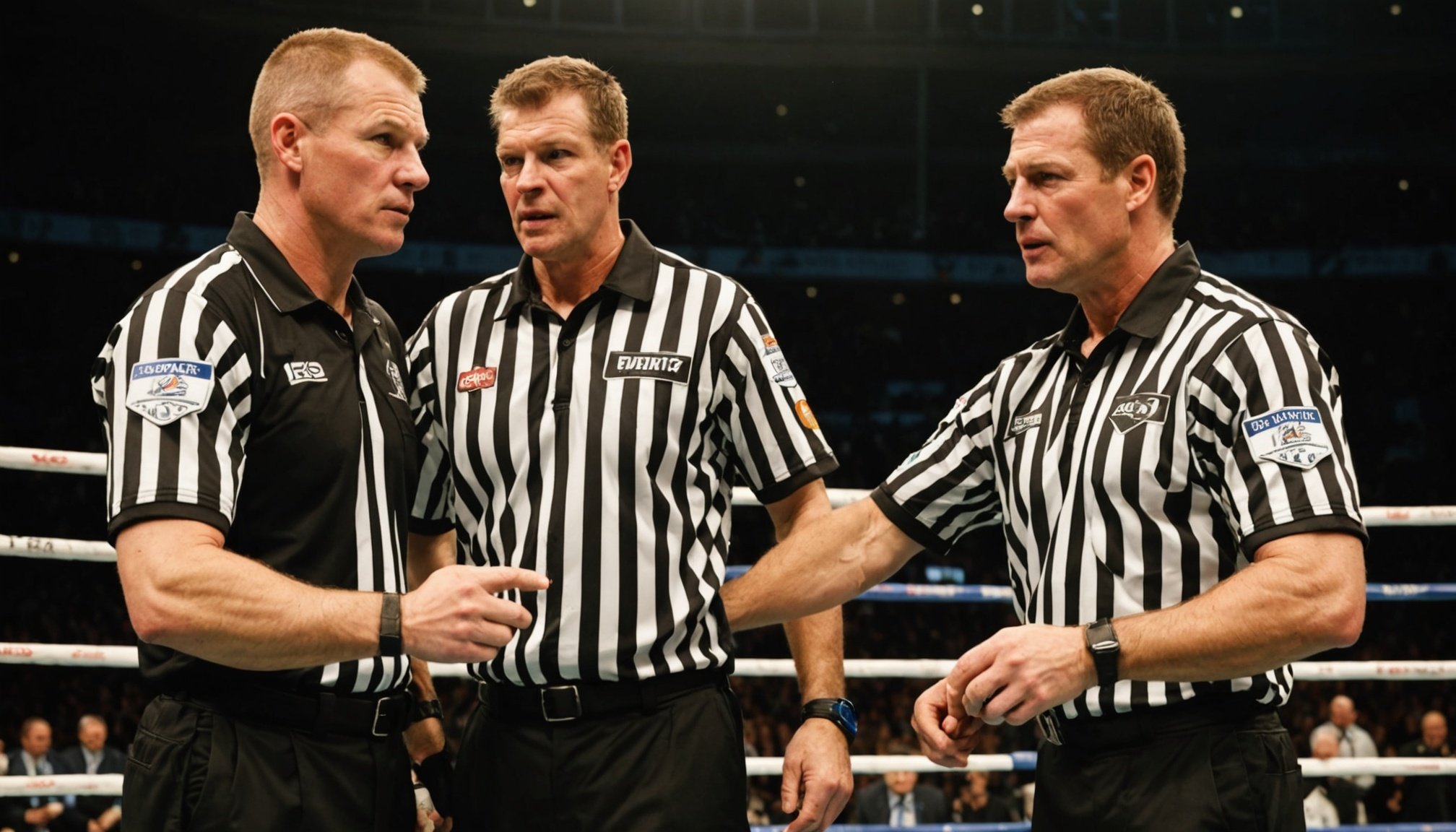Understanding the Role of Referees in Combat Sports
Referees play a vital role in ensuring fair play within combat sports. Their primary responsibility lies in enforcing the rules and regulations, thus ensuring that matches are conducted in a safe and equitable manner. They utilise their knowledge of combat sports regulations to make real-time decisions that can significantly affect the outcome of a match.
One of the key aspects of refereeing is maintaining impartiality and objectivity. Referees must ensure that their personal biases do not influence their judgments, allowing each competitor a fair chance to showcase their skills. This impartial approach is critical to officiating, as it upholds the integrity of the sport and builds trust among athletes and spectators alike.
Also to see : Ultimate guide to off-season nutrition: key dietary tips for uk boxers
The impact of referees on the integrity of combat sports cannot be overstated. Their decisions during a match can alter the course of an athlete’s career, affecting rankings and future opportunities. Therefore, their role as officiating authorities underscores the importance of rigorous training and a comprehensive understanding of combat sports regulations. Their unbiased oversight ensures fairness, ultimately preserving the sport’s competitive spirit and credibility.
Best Practices for Ensuring Equity in Officiating
Navigating the world of combat sports referees requires adhering to principles of fairness in officiating. Achieving consistent decision-making is paramount. It involves not only following standardized rules but also applying them impartially across all matches. This ensures that each decision made by combat sports referees stands up to scrutiny and maintains the integrity of the sport.
Also read : Ultimate guide to off-season nutrition: key dietary tips for uk boxers
Transparency in judging and scoring is another cornerstone of equitable officiating. This means openly communicating the criteria for judgments and ensuring that these methods are accessible to athletes, coaches, and fans alike. Clear and understandable scoring criteria prevent misunderstandings and foster trust between participants and officials.
Referees often face intense situations where maintaining composure is crucial. Techniques such as deep breathing, focusing on the task, and preparing mentally can help referees maintain their poise under pressure. Such techniques are essential not only for the individual’s performance but also for upholding fairness in officiating during crucial moments in combat sports.
By prioritising these best practices, combat sports referees can ensure a fair, transparent, and respectful environment that honours the competitive spirit. This dedication to maintaining integrity helps to build confidence in the sport and its officiating standards.
Training and Development for Combat Sports Referees
Training and development are crucial for combat sports referees to maintain high officiating standards. Referee training programs offer comprehensive modules covering rules, ethics, and decision-making under pressure. Continuous development ensures referees stay updated with the evolving dynamics of combat sports. These programs are designed to enhance the understanding of the sport’s nuances, enabling referees to perform their roles with accuracy and confidence.
Essential Training Components
Aspiring referees participate in training sessions which include theoretical knowledge and practical exercises. Key components are understanding sport-specific rules and honing skills like conflict resolution. This foundational training ensures referees can interpret and apply rules consistently during matches.
Resources for Continuing Education
Continuous development resources are integral for referees to remain proficient. Ongoing education includes workshops, seminars, and online courses, which provide insights into new regulations and technological advancements in sports officiating. Certifications from recognised bodies help validate and improve a referee’s expertise.
Mentorship Opportunities
Mentorship programs are invaluable for new referees, offering guidance from experienced professionals. Mentorship helps trainees apply theoretical knowledge in practical settings, deepening their understanding. It also fosters a supportive learning environment, encouraging growth and confidence.
By incorporating these elements, referee training programs equip individuals with crucial skills and knowledge for efficient officiating in combat sports.
Case Studies of Effective Officiating Techniques
In the fast-paced world of combat sports, referees play a critical role in ensuring fair play and safety. Real-life referee case studies offer invaluable insights into the art of officiating. These examples highlight how effective techniques can significantly improve match outcomes.
One compelling success story features a referee who integrated equitable practices, maintaining impartiality throughout high-stakes matches. By consistently applying the rules and demonstrating clear communication, athletes respected judgments, resulting in smoother, more enjoyable contests.
Successful techniques frequently include maintaining close proximity to the action without obstructing it, ensuring optimal visibility of crucial interactions. This approach enables referees to make better-informed decisions, minimise disputes, and maintain the flow of the game.
Lessons learned from key events in the UK combat sports landscape emphasise the importance of training and adaptability. Referees who continually seek feedback from peers and mentors can refine their skills further. As a result, they become adept at handling unpredictable scenarios, fostering a culture of fairness and respect in the sport.
These case studies underscore how adopting a strategic approach through continuous learning can lead to better judgments, solidifying the referee’s role as a trusted arbiter on the field.
Challenges in Achieving Equity in the Ring
Referees in combat sports face numerous challenges in officiating. Common biases often arise, influencing their decisions during crucial moments. These biases can stem from various sources, such as personal preferences, preconceived notions, or public and media perceptions. Addressing these biases is crucial to uphold fairness and integrity in the sport.
External pressures further complicate the referee’s task. They might face expectations from promoters, coaches, or even fans, which can unduly sway critical decisions. Such pressures amplify the combat sports issues related to maintaining impartiality and fairness.
To combat these challenges, several strategies can be employed. Continuous training that focuses on identifying and mitigating personal biases is essential. Enhancing awareness among referees regarding biases can improve decision-making processes. Additionally, employing technology to aid in officiating, such as video replays for contentious calls, can provide clearer insights and reduce human error. This combination of education and technological support is key in overcoming the challenges in officiating to ensure accuracy and fairness in the ring. Encouraging transparency and open communication within the sport fosters trust and supports referees in their objective role.
Regulations and Guidelines for Combat Sports Referees in the UK
Navigating the UK’s combat sports regulations demands an understanding of relevant laws and rules impacting refereeing. Key players in this landscape include governing bodies like British Boxing Board of Control (BBBC) and UK Muaythai Federation. These organisations are critical in setting standards for officiating, ensuring that sports are conducted fairly and safely.
Referees play a crucial role by adhering to these officiating guidelines, which are designed to bolster equitable decision-making during matches. Guidelines often focus on maintaining integrity and neutrality, thereby fostering a level playing field for all competitors. This includes clear instructions on scoring, controlling the match pace, and enforcing regulations consistently.
The UK’s combat sports regulations are comprehensive, often encompassing specific safety protocols and dispute resolution methods. These are intended to not only safeguard players but also enhance the sport’s credibility. Referees are thus tasked with a dual responsibility: enforcing rules while protecting participants.
By following these robust guidelines, referees and governing bodies collectively contribute to the sustainable development of combat sports in the UK, ensuring that matches remain competitive and just for everyone involved.










